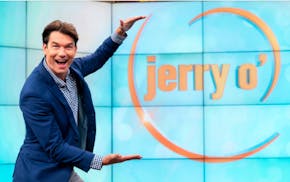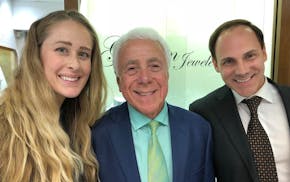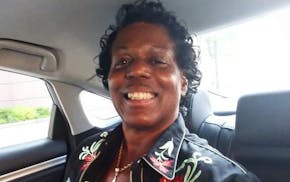Depression and suicide are issues Mariel Hemingway knows well, but it was too soon to discuss her friend Robin Williams' death by his own hand.
The actor, author and mental health advocate was in the metro for the first Camp Cambria for children with juvenile arthritis, an event in partnership with the Arthritis Foundation. She and her partner, Bobby Williams, took a nature walk with campers and talked about finding their life's passion.
"I love my association with [Cambria] because lifestyle is such a big party of what I do. I actually believe having a beautiful home is part of our wellness, part of our balanced life and I like beauty. It's also a really green company," Hemingway told me.
The granddaughter of great American author Ernest Hemingway, who committed suicide, told me there may have been more suicides in her family than the generally known number. In the 2014 Emmy-nominated "Running from Crazy" that she executive-produced, Hemingway examined her life and her family's history of suicide and mental illness.
Hemingway acknowledged Williams' death on Twitter: "Bless you sweet amazing robinwilliams Beyond TRAGIC AND SAD. Love to your family. The entire planet laughed & was happier because of him. The SUN is shining somewhere even when you feel there is only darkness."
When I interviewed her at the Cambria Gallery in Minneapolis, I asked her about Robin Williams in the context of depression, creativity and substance abuse. I also asked the actor who was nominated for an Oscar for "Manhattan" if she would ever again work with Woody Allen.
Beyond the credit of my startribune.com/video is a blast from the past, which captures me being consistent in my evaluation of Hemingway.
Q: Why "Running from Crazy" as a title for your film?
A: I jokingly said that to a friend of mine. I said, "We should just call it 'Running from Crazy' because that's what I've been doing my entire life." All joking aside, it really was what I thought I was doing and I was. I was afraid I was going to wake up crazy or have cancer like my mother or heart disease like my father or be addicted. There was so much addiction, mental illness, mental imbalance that I was afraid most of my life. And kind of unconsciously afraid. As things become conscious you start to be able to make choices.
Q: How old were you when you realized your family was a little crazy and I think most families are a little crazy so don't take that personally?
A: The truth is the reason why I did "Running from Crazy" is because I don't think this is my story. I think this is everybody's story. I think we all come from something, whatever it is. Even if you don't think that you come from any kind of mental imbalance, stress is hard on us. Stress is a mental illness. It's a mental imbalance for sure and we certainly have a lot of it in our society, so I did it because I want everybody to know they are not alone. If somebody like me can say, "This is my story, this is my family, these are the struggles I've been through and — who cares? — I made it to the other side. I want you to know you're OK and can make it to the other side as well."
Q: You told another interviewer you knew you were depressed. Everybody goes through that. But when you look back at your childhood was there an age where you now realize Wow, I was depressed then?
A: The irony is I didn't realize until I wasn't depressed that I'd been depressed most of my life. That was the norm. I came from that house, and I didn't know that being tired was a symptom of depression. I spent most of my days tired. Now, that is completely not the case. There are several different things, not only lifestyle — food, exercise, water, learning to meditate; I also do something called Brain State Technology [www.BrainStateTech.com] which balances the hemispheres of the brain through sound. Your brain hears itself in real time and collects itself because it wants to be balanced. It's brain wave optimization, so it's optimizing your brain waves to be balanced and in harmony with each other so that your brain is feeling good. So many of our issues in life are a brain problem. [Laughter] And that can be trauma to the brain, physical trauma and emotional trauma. My partner Bobby Williams, whom I wrote "Running with Nature" with, introduced me to it. Wow, I was depressed. I'd managed it really well through my lifestyle choices. I never was on medication, I was fortunate. When that door opened and I realized you could find happiness, you can find recovery from depression. At least in my life that was a great joy for me. It was amazing, like freedom.
Q: Have you taken any conscious steps with your daughters not to repeat generational patterns that have led to tragedies in your extended family? Seven suicides, if that number is correct, is a lot.
A: Yes, that's a lot of suicides. I do come from seven suicides, if not more. I would say my working at my own life and understanding the family and the suicides is the first step in healing. Telling our story, whatever our story is, and maybe my daughters will have to tell their own story [laughs]. God knows. [More laughter] I don't know. I hope not. But I'M HOPING my ability to kind of delve into this issue means that they are free of my problems. Yeah, because I think generations keep handing off the problem. Until somebody says, 'Hey the buck stops here.' I wanted that to be me and I hope that's the case. My girls seem to be extremely open and really understanding of the problem and very aware they need to be mindful of it.
Q: What's the accurate information. You thought about suicide once or have occasionally?
A: I never would have committed suicide but I've had suicidal thoughts. That was many years ago. The great thing about Brain State is that I don't even have remote thoughts like that. I don't have depression. I don't suffer at all. I am grateful. I just know that telling our story is a big important piece of it because there is stigma attached to mental illness. People don't like it and it's been around far longer than diseases people are obsessed with. We need to talk about it, we need to be OK with it. People can be functional, extremely successful and fine and still suffer from something that needs to be dealt with in some way. However they deal with it, whether they need to take medication or do what I did with and do it through lifestyle and Brain State, it's their choice and they need to not feel alone. That's my thing: You're not alone, we are all in this together.
We are all dealing with something.
Q: Chronic depression doesn't go well with anything, but the death of Robin Williams is a reminder, perhaps, of how deadly it can be when mixed with creativity and substance abuse?
A: You bring up a very interesting point. I think substance abuse and addiction is a huge part of why there is so much depression and mental illness. It's an oxymoron. What happens with the depression, you are starting to self-medicate the depression with the addiction, whether it's drugs or alcohol. The irony is the drug or alcohol is a depressant; it makes it worse. It's a vicious cycle. I really believe we need to focus on addiction as being as big a part of the problem. That's why I talk about holistic living, healthy lifestyle. What do you eat? What do you drink? How do you live? How do you wake up in the morning? It's everything we do it's not just one thing. And it's not just one pill, or one exercise.
Q: One of my colleagues was telling me about the antics photographer Yousuf Karsh pulled on subjects to get memorable photos. What do you suppose he did to your grandfather?
A: I don't know that he probably had to do a whole lot. This was toward the end of his life. I know this photograph well. You know, my grandfather was very tortured toward the end of his life because he couldn't write anymore. You asked me about passions. When you have a passion, something you love and you can't do it anymore, that to him was horrible. He was an extraordinary talent. While I think we're a little bit crazy, we are also tremendously creative and there is that link. I want to undo that. I want to be able to say, "We can be creative geniuses and still be healthy and happy." There is a belief system behind creativity and darkness. I think if we crack open the belief system, we can began to live different lifestyles that don't support the addictions and the problems.
Q: You and your partner took Camp Cambria campers on a nature walk so they could discuss their life's passions. How long did it take you to find your life's passion?
A: Interesting question. I think for some people they fall on it easily. I've always done what I love to do. I love to act. I love to lead a healthy lifestyle, and the two kind of intertwined. In kind of discovering who I am, why I make the choices that I've made, I fell into having a passion to help people who suffer from mental illness, through lifestyle choices, all the different choices they make every day. From food to exercise to water to breathing air to taking time to be still. All of these things are really an important part of our mental balance. So I guess I found it through living my own life and trying to discover who I am.
Q: Howard Kurtz, of FOX's "Media Buzz" and before that CNN's "Reliable Sources," seems to have the wildest crush on you. Are you oblivious to this?
A: I love Howard. Howard is a very good friend. Perhaps he has a wild crush on me, but God bless him. You've got to let somebody have a wild crush on you. He's a really good person. He's been really helpful to me and a tremendous supporter and really understands me and my family. Whether or not he has a crush on me, he's been really open to having a dialogue about creativity and my life and where I come from in a way that's been very helpful to me. He's a great guy.
Q: Ever see yourself acting in another Woody Allen movie?
A: Umm, yes! I think that will happen. Woody and I are in contact. I would love to work with him again. I think it would be amazing. …. He was always a gentleman with me.
Q: Do you remember all the stage direction you gave me the last time I interviewed you?
A: [Laughter] I don't. I don't like to be shot up and probably I said that.
Q: I don't think there are any bad angles of you.
A: Oh you're kind; you're very nice. Oh, stop [She playfully gestures for me to stop and continue simultaneously.]
Q: If Bear Grylls calls, are you willing to go "Running Wild" with him?
A: Of course. I would like Bobby to be there because I think that any challenge Bobby would be given I could just sit in the background and go Yeah. I'll be the cheerleader. I'm not so sure I want to put myself in great danger.
Q: Did you see the one where Grylls was eating rattlesnake with Channing Tatum?
A: That wouldn't faze me. Eating something wouldn't faze me. What would scare me is deep cold water of some sort.
Q: Well, there's a lot of that going on with Grylls.
A: I would not be into ocean waves and cold water. None of that, thank you.[Laughter]
Interviews are edited. To contact C.J. try cj@startribune.com and to see her watch FOX 9's "Buzz."

C.J.: Jerry O'Connell gets support from Wendy Williams for talk show




